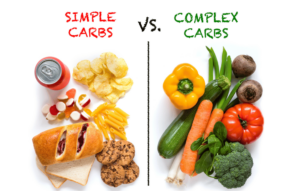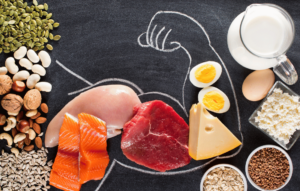There’s a lot going on in the modern world and, unfortunately, the importance of proper nutrition often takes a backseat to the demands of work, family, and daily responsibilities. Yet, the food choices you make every day play a crucial role in your overall health, performance, and vitality. Whether you’re an athlete striving for peak performance, a professional aiming for sustained energy, or just a regular guy looking to improve your well-being, your diet is foundational for your well-being, and finding the right diet can be wildly transformative.
This blog is dedicated to helping you get some clarity so that you can navigate the complex (arguably overly complex) world of nutrition. Our guiding principle, inspired by Dr. Ben Bikman, is simple yet powerful: “Caution with carbs, don’t fear healthy fats, and prioritize protein.” By adhering to these core tenets, you can fuel your body in a variety of settings for optimal performance and long-term health.
In the following sections, we’ll lay out some practical tips and strategies for minimizing processed foods — especially those sneakily unhealthy carbohydrates — while outlining a method for you to hit the protein goals you need to build and maintain some solid muscle. We’ll also explore the importance of embracing healthy fats and steering clear of refined oils.
So, whether you’re looking to build muscle, boost your energy levels, or simply feel better every day, this guide will equip you with the knowledge and tools you need to make smart dietary choices. So let’s go boys; take the first steps toward leveling up your nutrition game and unlocking your full potential.
Caution with Carbs
Carbohydrates are one of the primary macronutrients that provide energy to our bodies. They come in two main forms: simple and complex. Simple carbohydrates, found in sugary snacks and drinks, are quickly absorbed, typically leading to rapid spikes in blood sugar levels. Complex carbohydrates, on the other hand, are found in whole grains, vegetables, and legumes, providing a slower and more sustained energy release.
bodies. They come in two main forms: simple and complex. Simple carbohydrates, found in sugary snacks and drinks, are quickly absorbed, typically leading to rapid spikes in blood sugar levels. Complex carbohydrates, on the other hand, are found in whole grains, vegetables, and legumes, providing a slower and more sustained energy release.
Minimizing Processed Carbs
Processed carbohydrates, such as white bread, pastries, and sugary snacks, can wreak havoc on your health and performance. These foods often lead to blood sugar spikes followed by crashes, causing fatigue and making it difficult to maintain energy throughout the day. Over time, a diet high in processed carbs can contribute to weight gain, insulin resistance, and other metabolic issues. A study in 2018 found that only about 12% of American adults are metabolically healthy – that sad statistic  is largely due to the consumption of processed carbs.
is largely due to the consumption of processed carbs.
Choosing the Right Carbs
To optimize your diet, focus on incorporating healthier carbohydrate sources. Whole grains like quinoa, brown rice, and oats provide essential nutrients and fiber. Vegetables, especially leafy greens and non-starchy varieties are low in calories but high in vitamins, minerals, and antioxidants. Fruits, in moderation, offer natural sugars along with fiber, making them a much better alternative to sugary snacks.
Here are some tips for making smarter carb choices:
- Swap refined grains for whole grains: Replace the noodles and bread with their whole-grain or grain-free counterparts. White rice is still okay but you still need to be careful with it because it can certainly be overdone.
- Increase vegetable intake: Aim to fill half your plate with vegetables at each meal. Sweet potatoes as well as regular potatoes are also a great way to get your carb fix in that will be a bit easier on your blood sugar.
- Limit added sugars: This is a big one. Do your best to continually reduce your consumption of sweets, sodas, and processed foods high in sugar.

By being cautious with your carbohydrate intake and opting for nutrient-dense sources, you can maintain steady energy levels, support your overall health, and enhance your performance in all areas of life.
Prioritize Protein
Protein is a vital macronutrient that plays a crucial role in muscle repair and growth, immune function, hormone production, and overall health. It is essential for maintaining muscle mass, especially as you age, and helps in recovery from workouts. Also, protein has a higher satiety value than any other macronutrient, meaning that prioritizing it in your diet will have you feeling full both faster and longer, aiding in weight management and preventing overeating.
Hitting Protein Goals
To reap the benefits of protein, aim for a daily intake of about .82 grams per pound of target body weight. This target can help support muscle growth and repair, especially if you’re physically active or looking to build some muscle mass. Achieving this goal might seem daunting, but with a little planning, it’s entirely manageable – just prioritize protein-dense foods in your meals a few times a day and you’ll get there with some practice.
Examples of High-Protein Foods
- Lean meats: Chicken, turkey, and lean cuts of beef and pork.
- Fish: Salmon, tuna, and other fatty fish provide not only protein but also omega-3 fatty acids.
- Eggs: A versatile and nutrient-dense protein source.
- Dairy: Greek yogurt, cottage cheese, and milk.
- Plant-based options: Lentils, chickpeas, quinoa, tofu, and tempeh.
Meal Planning for Protein
Incorporating sufficient protein into your diet requires intentional meal planning. Here are some strategies to ensure you hit your protein goals:
- Start with Protein: Begin your day with a protein-rich breakfast, such as eggs, sausage, or Greek yogurt with nuts and seeds.
- Protein with Every Meal: Include a high-protein source in each meal. For example, add chicken to your salads, get an extra side of shrimp with your lunch, or make a protein shake after your workouts.
- Healthy Snacks: Keep high-protein snacks like nuts, jerky, or cottage cheese on hand for between meals.
Example of a Protein-Focused Day of Eating
- Breakfast: Scrambled eggs with spinach, avocado, and a banana
- Lunch: Grilled steak salad with mixed greens, tomatoes, and quinoa.
- Dinner: Baked salmon with roasted vegetables and a sweet potato.
- Snacks: Greek yogurt with berries, a handful of almonds, or a protein smoothie.
By prioritizing protein in your diet, you’ll support muscle maintenance and growth, improve satiety, and enhance your overall health and performance. This approach not only helps in achieving fitness goals but will also seriously contribute to long-term well-being.
Don’t Fear Healthy Fats
Fats have long been misunderstood, often demonized in the quest for a healthier diet. However, not all fats are created equal. Healthy fats are essential for various bodily functions, including hormone production, brain health, and energy provision. They also play a role in absorbing fat-soluble vitamins (A, D, E, and K) and can help improve satiety, reducing overall calorie intake.
Healthy Fats to Include
Incorporating healthy fats into your diet can have numerous benefits. Here are some sources of good fats:
- Avocados: Rich in monounsaturated fats, fiber, and various vitamins and minerals.
- Nuts and Seeds: Almonds, walnuts, chia seeds, and flaxseeds provide healthy fats, protein, and fiber.
- Olive Oil: A staple of the Mediterranean diet, olive oil has some serious health benefits being high in monounsaturated fats and antioxidants.
- Fatty Fish: Salmon, mackerel, sardines, and other fatty fish are excellent sources of omega-3 fatty acids, which are incredibly important for overall health.
- Coconut Oil: Contains medium-chain triglycerides (MCTs) that can be quickly utilized for energy.
- Animal Fats from Grass-Fed Animals: Grass-fed beef, butter, and ghee are rich in omega-3 fatty acids and conjugated linoleic acid (CLA), which have been linked to numerous health benefits.

How to Incorporate Healthy Fats
Integrating healthy fats into your daily meals can be straightforward and delicious:
- Add Avocado: Slice avocado into your salads, spread it on whole-grain toast, or even blend it into smoothies.
- Use Olive Oil: Drizzle olive oil over salads, use it in cooking, or dip bread (hopefully not conventional bread) into it as a healthier alternative to butter.
- Snack on Nuts and Seeds: Keep a mix of nuts and seeds handy for a quick, nutritious snack. This is an absolute game-changer for those mid-day hangry moments.
- Enjoy Fatty Fish: Aim to eat fatty fish at least twice a week. Grill, bake, or broil for a tasty and healthful meal.
- Cook with Coconut Oil: Use coconut oil to cook at medium heat, adding a subtle flavor and beneficial fats to your dishes. Be careful to not bring it past its smoke point.
Minimizing Refined Oils
Refined oils, such as vegetable oil, soybean oil, and canola oil, are often heavily processed and can contribute to inflammation and various health issues. They are commonly found in processed foods and fast food items.
To reduce your intake of refined oils:
- Read Labels: Check ingredient lists on packaged foods to avoid those containing refined oils.
- Cook at Home: Preparing meals at home allows you to control the types of fats used in cooking.
- Choose Whole Foods: Opt for whole, unprocessed foods whenever possible, which are less likely to contain unhealthy fats.
By not fearing healthy fats and minimizing refined oils, you can support your body’s essential functions, improve satiety, and maintain a balanced diet that promotes overall health and vitality.
Final Thoughts
Embracing a diet that prioritizes protein, includes healthy fats, and exercises caution with carbohydrates can, and likely will, lead to significant improvements in your health and performance. By focusing on whole, unprocessed foods and making mindful dietary choices, you can unlock an entirely new world of potential and step into a beautiful state of peak vitality.
Remember this guiding principle of “caution with carbs, don’t fear healthy fats, and prioritize protein” – it’s a simple but powerful approach to navigate the often overcomplicated world of modern nutrition. By minimizing processed foods, especially refined carbohydrates and oils, and ensuring you meet your protein goals, you can create a sustainable diet that allows you to look, feel, and perform your best.
overcomplicated world of modern nutrition. By minimizing processed foods, especially refined carbohydrates and oils, and ensuring you meet your protein goals, you can create a sustainable diet that allows you to look, feel, and perform your best.
Start making small but consistent changes today, and watch your life transform bit by bit. Whether you’re aiming to build muscle, boost your energy levels, or improve your overall health, these dietary tips will set you on the right path. Stay informed, stay motivated, and take control of your nutrition for a healthier, more vibrant future. The world needs us to be healthy, so let’s go guys.








